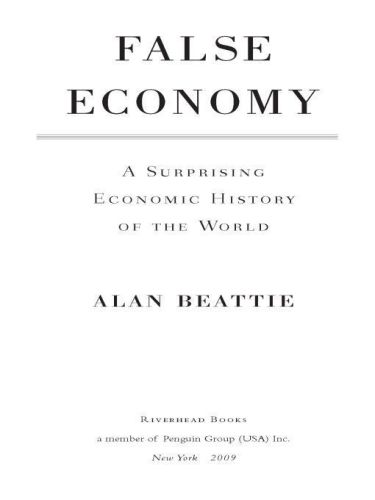
False Economy
A Surprising Economic History of the World
کتاب های مرتبط
- اطلاعات
- نقد و بررسی
- دیدگاه کاربران
نقد و بررسی

February 23, 2009
Financial Times
world trade editor Beattie combines economic history, psychology and political analysis to identify the factors that predispose economies to sickness or health. The author takes a human interest, Freakonomics
-style approach to such economic riddles as why Islamic nations stay mired in poverty (he argues that one reason might be the Qur'an's dictum against usury and interest-earning) and why Africa is dependent on exporting raw materials rather than commercial products (soaring temperatures and shoddy infrastructure). Beattie imbues economics with wonderful mystery as he untangles the mechanisms of the blood diamond trade and Peru's curious stranglehold on the global export of asparagus. Closer to home, Beattie examines the economic rivalry between Argentina and the United States a century ago; when Argentina seemed to be winning, the U.S. made a series of crucial decisions, moved forward and left Argentina poised for financial disaster. Thorough research, eclectic examples and a sprightly tone (“Puritans were not big on bling”) should make this a hit among those interested in world economics—and a must-read alternative for those who couldn't get through Guns, Germs and Steel
.

February 15, 2009
Free markets are born of free societies. So why are our markets no longer free? Bad choices were made—therein lies the nub of Financial Times world trade editor Beattie's excursus into economic history.
Progress, warns the author, is"fragile and reversible," and there are no inevitabilities involved: Capitalism is neither intrinsically bound to fail nor predestined to succeed; the United States is not wealthy because of exceptionalism, Africa poor because of some sort of original sin. All these conditions turn on choices, some freely made, some made by custom and even accident. For instance, Beattie notes, in the 19th century Argentina had the opportunity to be as wealthy as the United States, with plenty of resources and land and millions of cows with which to feed a hungry Europe. What kept it from emerging as a major power was its rigid adherence to class and caste, with illiterate immigrants doing grunt work while the children of the aristocracy basked. Meanwhile in America, upward mobility was standard. Beattie writes that globalization is nothing new. The late-19th and early-20th-century market was global too, so that wheat farmed in Nebraska cost about as much in London as it did in Chicago and currencies were valued fairly evenly. There are many elements that fuel economic failures: inefficiencies and excessive waste, retreats from globalism, structural impediments (for example, it takes coffee beans a month to get across Africa, held up at one customs stand after another) and corruption. All these figure prominently in Beattie's lucid exposition, which is often pleasingly arch, as when he likens a longshoreman's union agitating against containerization to"bandits controlling the mountain pass."
A readable, timely discussion of the world economic system.
(COPYRIGHT (2009) KIRKUS REVIEWS/NIELSEN BUSINESS MEDIA, INC. ALL RIGHTS RESERVED.)

April 15, 2009
Beattie worked as an economist at the Bank of England and then joined the Financial Times in 1998 and is currently the papers world-trade editor. This is not a criticism of the 200407 real-estate debacle that caused the collapse of U.S. and world financial systems, as might be surmised by the title, but rather a historical glimpse at the causes and effects that explain why some economies prosper in certain ways while others do not. Beattie contrasts the economies of Argentina and the U.S., for example, showing why Argentina has prospered even while our economic downturn has seemingly brought down the economies of the rest of the world. He compares the ancient city of Rome to present-day large metropolises; explains how trade routes and climate (both political and meteorological) affect where crops are grown and how they are processed; and looks at some of the idiosyncrasies of corruption and power. By looking back to look forward, Beattie concludes that the experience of history provides hope that we have the ability to make the right choices going forward.(Reprinted with permission of Booklist, copyright 2009, American Library Association.)

























دیدگاه کاربران